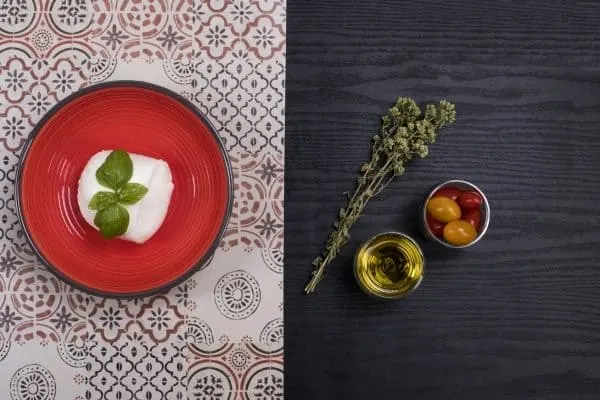Let’s talk about the shelf life, expiration, and storage of vegetable oils.
So you found a half-open bottle of vegetable oil that’s a couple of months beyond the printed date, and you’re wondering: does vegetable oil go bad?
Or maybe you need to know how long vegetable oil lasts after opening the bottle.
Either way, you want to learn a thing or two about vegetable oils. And that’s what this article is all about.
But before we get to the nitty-gritty, let’s quickly cover what vegetable oil actually is.

What Is Vegetable Oil, Exactly?
In theory, vegetable oil is an umbrella term for every oil that falls under the “vegetables” category. The list of possibilities is pretty long and includes popular oils such as canola or avocado oil and much more niche products, such as mustard oil or poppyseed oil.
(Yeah, oils from fruits and nuts are also considered vegetable oils. It beats me, too.)
But if you’re buying a bottle labeled “vegetable oil” in the grocery store, it’s not difficult to guess what you’ll get. You’re most likely buying refined soybean oil (example #1, #2, #3), canola oil (example), or one of the other cheap and popular refined oils.
I mean, it’s no surprise brands don’t sell expensive oils (such as unrefined avocado oil) for half their regular price.
Furthermore, it’s almost certain that the oil will be refined. That means it’ll have a pretty neutral flavor and aroma, and a relatively high smoke point, making it suitable for cooking and deep frying.
Knowing that, you won’t be surprised that all that you know about the shelf life and spoilage of canola oil applies to vegetable oil too.
(Cooking oil is, practically speaking, almost synonymous with vegetable oil, to make things even more confusing.)
Having that out of the way, let’s talk about the spoilage of vegetable oil.
Does Vegetable Oil Go Bad?
Vegetable oil goes rancid if stored for too long or in bad conditions. That’s the most common way it spoils.
You can tell your vegetable oil is rancid if it tastes bitter or sharp, or smells like putty, old paint, or nail polish remover. The aroma change isn’t always easily discernible, but the flavor usually is.
Of course, rancidification is a gradual process, so in the beginning, you might only notice a tiny change in taste that will grow over time.
My advice is to use the oil as long as it tastes a-okay, and once the bitter and sharp notes start to take over, toss it.
(Eating a bit of rancid oil isn’t an issue in the short term, but it might have negative consequences, especially if you’re consuming it regularly and in larger amounts.)
Of course, going rancid isn’t the only possible spoilage sign. Let’s talk about others.

How to Tell if Vegetable Oil Is Bad?
Discard vegetable oil if:
- You’ve used it several times, and its quality is bad. If your deep-fried food turns out greasy instead of crisp, the fat is foaming, it has darkened, or it smokes before the oil reaches its target temperature, it’s done for. Read more about reusing oil in my article on the spoilage of peanut oil.
- The oil smells off. Rancid oil often smells like old paint or some sort of chemical solvent. If that’s the case for your oil, get rid of it. Since refined oils have a neutral aroma, any other noticeable smell usually means the oil is no good, too. Please note that if your veggie oil smells like what you cooked in it last time, it might be okay to use, but consider how that will affect whatever you want to cook next.
- It tastes bitter or sharp. Those are the hallmark signs of rancid oil. To test your oil for rancidity, take a sip and see how it tastes. No worries, a bit of rancid vegetable oil won’t result in you spending the afternoon on the toilet.
- There’s anything in the bottle that shouldn’t be there. Check the bottle’s surface, bottom, and neck for any contaminants, “nasties,” or anything else that might have found its way into the bottle. Oils don’t grow mold if stored properly, but all bets are off if they get contaminated.
Finally, if there’s anything else about the oil that makes you feel uneasy, it’s probably better to trust that impulse and open a fresh bottle.
Next, let’s talk about the shelf life of vegetable oil.
How Long Does Vegetable Oil Last?
Vegetable oil retains quality for about 2 years unopened and around 6 months after opening, assuming you store it in a cool and dark place, away from heat sources.
Those are the periods you’re likely to find printed on the bottle, but if you store the oil properly, you’ll likely get at least a few extra months without any quality issues.
Furthermore, refined oils typically stay good longer than others, so those periods are really conservative.
If you’re wondering, the drastic drop in storage time after opening is caused by the fact that when you open a bottle, the oil inside gets access to fresh air, which speeds up the rancidification process.
(It works the same for other oils, including sesame oil, grapeseed oil, and others.)

Expired Vegetable Oil
The date printed on your vegetable oil bottle is a best-by date, and it’s only a rough estimate of how long the oil should retain quality.
Some sellers recommend discarding their oils when they “expire,” but as long as the quality is alright, there’s no reason to do so.
That means you can use “expired” vegetable oil, assuming that its quality is good and it doesn’t show any signs of spoilage. Nothing bad will happen just because you’re using vegetable oil beyond its printed date.
That said, the older the oil gets, the more attention you should pay to its quality. Using rancid oil is no good for both your dishes and your health.
Finally, to ensure your veggie oil lasts well beyond its date, you should take good care of it. Let’s talk about how.
How to Store Vegetable Oil
Store your vegetable oil in a cool and dark spot, away from heat sources like the stove. And make sure it’s always sealed tightly when not in use.
If you want it to retain quality for longer, you can refrigerate it.
If you decide to store yours in the fridge, remember that it might become a bit cloudy. That’s not a spoilage sign, and you can easily reverse that effect by warming the oil up to room temperature.
That said, refined oils typically retain quality for quite some time, so refrigeration is hardly ever needed, even in the middle of a hot summer or if you live in the tropics.
If you want to store your vegetable oil within arm’s reach and not in a closed cabinet, consider pouring it into a dark bottle or canister. That opaque glass will protect the oil from sunlight, helping it keep its quality slightly longer.
Vegetable Oil Shelf Life and Spoilage Summary
Thanks for reading this primer on vegetable oil. Here are the takeaways:
- Vegetable oil goes rancid if stored for too long or in poor conditions. You can tell that yours is rancid if it tastes bitter or sharp, or gives off a chemical-like odor.
- Vegetable oil lasts at least 2 years unopened and 6 months after opening. Those are the standard guidelines on oil bottles, but since these oils are refined, they usually last months longer. You can use vegetable oil for as long as it doesn’t show any signs of spoilage, regardless of the date printed on the label.
- Store vegetable oil sealed tightly and in a cool and dark place, away from any heat sources. If you want to prolong its shelf life even further, consider refrigeration.